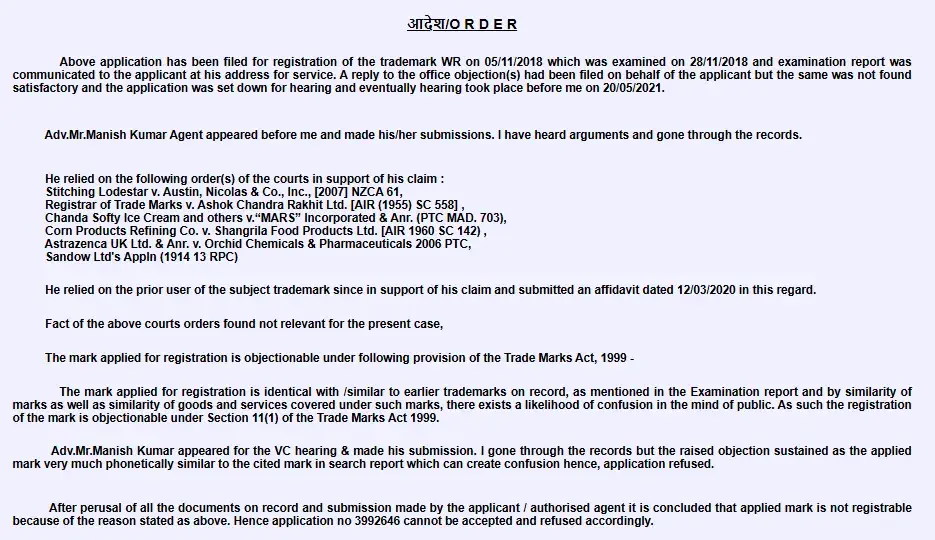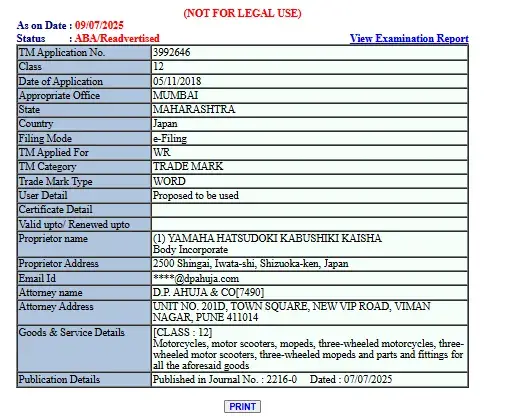By Vikrant Rana and Aashi Nema
Introduction
In a significant decision rendered in Yamaha Hatsudoki Kabushiki Kaisha vs. The Registrar of Trade Marks, the Bombay High Court addressed the scope and application of procedural obligations of the Registrar of Trade Marks while examining trademark applications. The present case revolved around the refusal of registration of the trademark “WR” sought by Yamaha, a globally renowned and leading manufacturer of motorcycles and related vehicles.
Facts of the Case
Yamaha Hatsudoki Kabushiki Kaisha, a Japanese company founded on July 01, 1955, has been a global player in the two-wheeler and ATV segments. It applied for the trademark “WR”, bearing trademark application no. 3992646 in Class 12 (relating to motorcycles and related vehicles) with the Trade Marks Registry, Mumbai on November 5, 2018. The Trade Marks Registry raised objections in the Examination Report, citing conflict with Honda’s registered trademark “WR-V” under Section 11(1) of the Trade Marks Act, 1999.
Despite Yamaha’s detailed responses in December 2018 and July 2020, the Registrar refused registration in May 2021 without a reasoned order, prompting Yamaha to file the present Petition.
Contentions of Plaintiff
- Acquired Distinctiveness in brand Yamaha: Petitioner contended that it coined and adopted the trademark WR in August, 1990 with respect to two wheeler and three wheeler products. Being the second largest in motorcycle sales in the world, the Petitioner contended that it has acquired distinctiveness in the brand Yamaha.
- Global Reputation & Prior Use: Yamaha emphasized that it has sold the products bearing trademark “WR” in 131 countries since 1999 and currently, it is selling in 62 countries. The motor vehicles bearing the trademark “WR” has received many awards and recognition. It has also secured registrations in over 60 countries, including the USA, EU, Japan, Australia, and New Zealand.
- Concurrent Usage: It argued that its mark “WR” and Honda’s “WR-V” had coexisted in international markets without confusion.
- Transborder Reputation: Yamaha claimed that its motorcycles under the “WR” mark have considerable presence and reputation even in India, through websites, media coverage, and awards and recognitions.
- Procedural Lapse: The petitioner alleged that the Registrar passed a cryptic, unreasoned order without considering the detailed responses and evidence, thereby violating principles of natural justice.
- Relied on Precedents: Yamaha cited Milment Oftho Industries & Ors. vs. Allergan Inc., (2004) 12 SCC 624 to highlight that transborder reputation extending to India cannot be ignored.
Following is the timeline of Yamaha’s trademark Application:
| Date | Particulars |
| 28/11/2018 | Examination Report was issued in which trademark “WR-V” bearing registration no. 31539958 in Class 12. |
| 26/12/2018 | Initial reply to Examination Report was filed. |
| 08/07/2020 | Documents in support of show cause hearing was filed consisting of detailed response to Examination Report. |
Contention of the Defendant
- Likelihood of Confusion: The Registrar justified the refusal, maintaining that “WR” and “WR-V” were confusingly similar, both falling under Class 12.
- Territoriality Principle: Citing Toyota Jidosha Kabushiki Kaisha vs. Prius Auto Industries Limited & Ors., (2018) 2 SCC 1, the Registrar argued that foreign use and reputation must translate into significant presence and consumer recognition in India to matter.
- Adequate Consideration: It was contended that the order was brief but not devoid of reasoning, and Section 11(1) was appropriately applied.

Court’s Observation
The Hon’ble High Court of Bombay, while agreeing that Section 11(1) could be invoked, held that the Registrar failed to consider the petitioner’s elaborate submissions. The Court emphasized:
- Need for Reasoned Orders: A cryptic order without examining vital evidence undermines the statutory scheme and the Petitioner’s rights.
- Special Circumstances Present: Given Yamaha’s long-standing international use, concurrent existence of both marks globally, and claimed reputation in India, the matter warranted a more nuanced consideration.
- Proviso to Section 20(1) of the Trade Marks Act, 1999 invoked: The Hon’ble Court noted that instead of outright refusal, the Registrar should have exercised discretion to advertise the mark before acceptance, enabling objections and opposition.
Court’s Order
The Hon’ble Court opined that the Registrar could not have refused to accept the trademark application while noting that “a direction ought to have been issued for advertisement before acceptance”. Hence, given the facts and circumstance of this case, the Hon’ble Court allowed the Petition and set aside the impugned rejection order of the Registrar with a direction to advertise the application of the petitioner before acceptance in terms of proviso to Section 20(1) of the Trade Marks Act.
Author’s Note
The ruling sets a precedent in ensuring that trademarks examiners exercise their powers with judicial discipline and not in a mechanical fashion. It reiterates that even in cases where statutory provisions like Section 11(1) are applicable, the Registrar must carefully examine responses and provide cogent reasons. This judgment revitalizes the role of transborder reputation in the Indian context, especially when global brand owners seek Indian registration. The decision also offers a practical path forward, by invoking the advertisement before acceptance route, to balance public interest with the Applicant’s rights. The current status of the trademark application no. 3992646 for the mark “WR” in class 12 now shows “ABA/Readvertised”, i.e. Advertised before Acceptance as can be seen from below snapshot:



